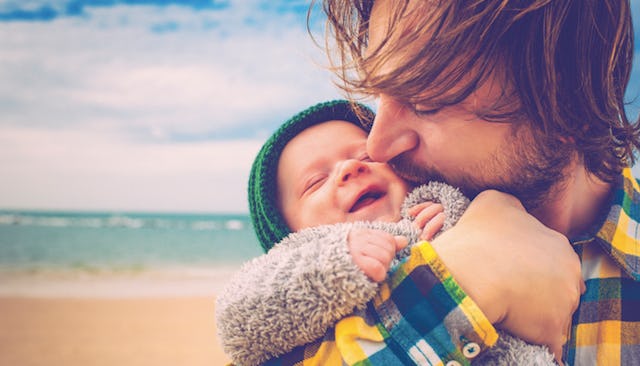What Placing Family First Really Means

I got married just after my 22nd birthday. Two years in, one month after my wife and I had our first child, a group of old friends asked me to go see some punk bands we used to love. I told them no at first, but then, they laid into me with the “stop being your wife’s bitch” treatment, as if any of them really knew what it meant to have a newborn baby, and I caved.
Looking back I should have stayed home that night — our newborn was a horrible sleeper — but I was still young (and dumb) enough to let peer pressure get to me. While the first band played, I was pinned between two teenagers and felt a pop in my knee that ended up being a permanent injury that required physical therapy, something we really couldn’t afford as young, new parents, still in college. To make matters worse, instead of going home, I decided to tough it out. Most of the night concertgoers bumped into me, hurting my knee, and I became really agitated.
Out of the men I hung out with, I was one of the first to get married, and it became a complicated battle between what my wife wanted from me as a husband, and what my friends still expected from me as a buddy. But at 22, I still really wanted to be one of the guys and a good father and husband. Not that you can’t be a father and husband and still be one of the guys, you can. But you have to put your family and wife first, regardless.
There are some conclusions you can make from all this. You could say that I got married too early, which I did. You could say that men are stupid, and frankly, sometimes they can be. But here’s what I know for sure: That night that I chose to go to a concert over staying home with my wife who was still recovering from a C-section while carrying for a fussy newborn was the wrong choice. I realized that while I was in the audience that night. I was struggling with the responsibility of being a new father. I felt old for my years, exhausted, and finally, when someone slammed into me from behind, I lost my temper, and hit a guy.
Not a lot happened, ultimately. I knocked him to the ground. He was drunk, and backed down when he saw that I was with a group. I came home late smelling of sweat and cigarettes, hobbling around our small two-bedroom home, leaning on furniture to keep my knee from giving out. Mel had been up with our son. Her eyes were red, hair a mess, and she looked at me with a stone cold gaze and asked me what happened. So I told her about my knee. I told her about throwing a punch.
“You hit someone?” she said. She didn’t say it with anger or offense. Her voice seemed to carry the same weight my mother’s did when she found out I’d really let her down.
“Yeah,” I said. Then I told her I was going to need to go to the doctor for my knee. She let out a breath, and I knew it had to do with all the medical bills we already had from our son’s birth. We would need to prepare to take on more debt because I let my emotions get the best of me and took my anger out on some random stranger (not my best moment).
Then she said something that still sticks out in my mind 10 years later, “You’re a father. Don’t you think you’re getting a little big for these sorts of things?” There was frankness to her voice. It wasn’t accusatory or malicious. “You need to start acting like you are someone’s father now” is essentially what she was saying. And she was right.
I went to bed that night thinking about what Mel said. I wasn’t mad. I was embarrassed. What she wanted was for us to work together, to compromise, and for me to place our family above my friendships. She wanted me to grow up so we could raise our family together.
I think a lot of new fathers make a few bad decisions. Having a child is the most life-changing event of one’s life, but growing up isn’t always a smooth transition, even after marriage and children. There are a lot of idioms out there for parenting: Placing family first. Setting a good example for our kids. In action, that looks like looking your old buddies in the eye and saying, “I really need to go home and help with the baby.” And none of it means that you are becoming less of a man, or that you are a “bitch.” (Can we stop using “bitch” as a synonym for weak or feminine now? It’s past time.) It means that you are embracing the responsibly of being a father, and honestly that means spending more time with your family than your friends.
And that really is the definition of adulting — family first.
The next morning I told Mel I was sorry for the night before. I promised her that I’d never do it again. I meant it, and I’ve been true to my word. My family is everything.